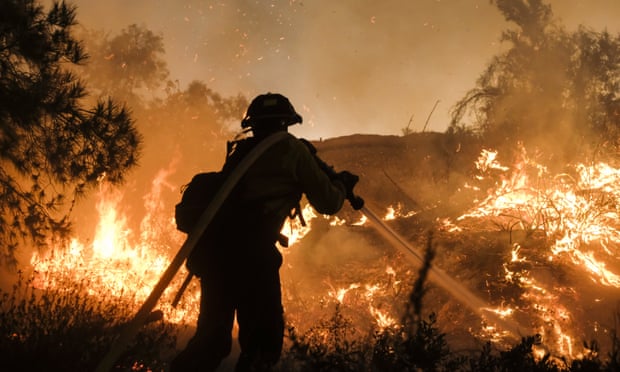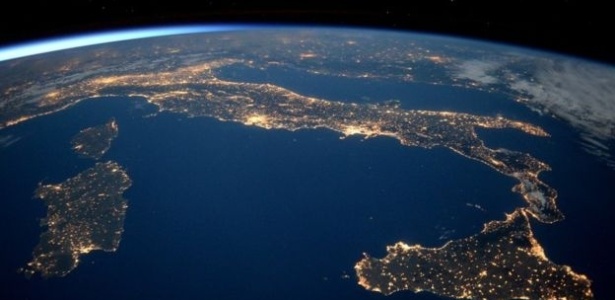We have 12 years to limit climate change catastrophe, warns UN
 The world’s leading climate scientists have warned there is only a dozen years for global warming to be kept to a maximum of 1.5C, beyond which even half a degree will significantly worsen the risks of drought, floods, extreme heat and poverty for hundreds of millions of people.
The world’s leading climate scientists have warned there is only a dozen years for global warming to be kept to a maximum of 1.5C, beyond which even half a degree will significantly worsen the risks of drought, floods, extreme heat and poverty for hundreds of millions of people.
The authors of the landmark report by the UN Intergovernmental Panel on Climate Change (IPCC) released on Monday say urgent and unprecedented changes are needed to reach the target, which they say is affordable and feasible although it lies at the most ambitious end of the Paris agreement pledge to keep temperatures between 1.5C and 2C.
The half-degree difference could also prevent corals from being completely eradicated and ease pressure on the Arctic, according to the 1.5C study, which was launched after approval at a final plenary of all 195 countries in Incheon in South Korea that saw delegates hugging one another, with some in tears.
Leia mais em Support the Guardian
Leaked US critique of climate report sets stage for political showdown in Korea
 Confidential government feedback casts doubt on scientific models, pushes domestic energy priorities and questions economic basis for climate action
Confidential government feedback casts doubt on scientific models, pushes domestic energy priorities and questions economic basis for climate action
Confidential US comments on a landmark global warming report raise doubts about the science behind it, warn that it risks crimping economic development and advocate for carbon-catching technologies.
The nine pages of comments on a draft of the UN report reflect the views of multiple government agencies and reveal a US diplomatic corps trying to speak to multiple constituencies – the global community, their own domestic interests and the White House.
The comments, which Climate Home News has seen, also set the scene for a political battle over the report summary, which is up for negotiation in South Korea this week after two years of preparation and due to be published on Monday.
Broadly, Washington argued that scientists had downplayed the scale of the challenge to limiting global warming to 1.5C – the lower target of the Paris Agreement. To meet that challenge, the US called for more emphasis on clean technologies that the Trump administration has consistently supported – including carbon capture and storage and nuclear power. At the same time, the US warned, measures to tackle global warming must not interfere with cutting poverty worldwide.
Leia mais em Climate Home News
Aquecimento global pode modificar eixo de rotação da Terra, aponta estudo da Nasa.
 O descongelamento dos polos está provocando uma sobrecarga lateral que torna a rotação da Terra sobre seu próprio eixo menos estável, afirmou nesta terça-feira (25) a Nasa.
O descongelamento dos polos está provocando uma sobrecarga lateral que torna a rotação da Terra sobre seu próprio eixo menos estável, afirmou nesta terça-feira (25) a Nasa.
Devido ao aquecimento global, provocado em parte pela ação humana, a camada de gelo da Groelândia perdeu uma massa equivalente 7,5 bilhões de toneladas que foi parar no oceano após o derretimento, afetando a estabilidade de rotação do planeta.
As conclusões foram apresentadas em uma pesquisa do Laboratório de Propulsão a Jato (JPL) da Nasa, que aponta que o deslocamento dessa massa é um dos principais fatores que afetam a estabilidade de rotação da Terra.
Leia mais em UOL.
Mobilidade elétrica na cidade: Veículos Coletivos e de Carga
 Uma revolução silenciosa: série sobre mobilidade elétrica.
Uma revolução silenciosa: série sobre mobilidade elétrica.
Filme 3: Mobilidade elétrica na cidade: Veículos Coletivos e de Carga
A mobilidade elétrica não é utilizada apenas em veículos pessoais, como carros e bicicletas: a tecnologia já chegou aos ônibus e caminhões do Brasil. No terceiro vídeo do PROMOB-e, mostramos o impacto positivo desta inovação nos centros urbanos e na vida das pessoas.
Realizado pelo Ministério da Indústria, Comércio Exterior e Serviços (MDIC) e pela Cooperação Alemã para o Desenvolvimento Sustentável, por meio da GIZ no Brasil, o PROMOB-e atua pela consolidação da mobilidade elétrica no Brasil.
More Articles...
- Aquecimento eleva risco de desertificação no Nordeste
- DERRETIMENTO DO PERMAFROST ESGOTA O ORÇAMENTO DE CARBONO ANTES DO PREVISTO
- Ações para reduzir emissões na agricultura ainda não são suficientes Este trecho é parte de conteúdo que pode ser compartilhado utilizando o link https://www.valor.com.br/agro/5852317/acoes-para-reduzir-emissoes-na-agricultura-ainda-nao-sao-suficientes o
- IV ENPJA ocorre em setembro
- Abordagens metodológicas para análise de Vulnerabilidades à Mudanças Climáticas
- A Cidade Universitária e o Consumo de Energia - Hoje
- Marcha pelo clima reúne mais de 30 mil pessoas nos EUA.
- Mobilização global ‘Una-se pelo clima’ realiza ações em mais de 90 países
- Navio bate em ponte e aeroporto fica isolado na passagem do Tufão Jebi no Japão
- NASA Discovers Bubbling Lakes In The Remote Arctic - A Sign Of Global Warming
- Elevação das concentrações de carbono na atmosfera ameaça a nutrição humana
- O aquecimento global já é realidade. E agora?
- Merkel diz ser contra novas metas de redução de emissão de gases na Europa
- XIII UFRJ AMBIENTÁVEL - Semana Acadêmica da Engenharia Ambiental
- A Professora e cientista Suzana Kahn participou do evento "Foco nos setores de Energia Elétrica e Petróleo e Gás", promovido pela Siemens.
- A Cidade Universitária e o Consumo de Energia
- Kofi Annan, Who Redefined the U.N., Dies at 80
- NASA releases time-lapse of the disappearing Arctic polar ice cap
- Árvores revelam evolução da poluição ambiental em São Paulo
- Presidente eleito terá de retomar trilha da responsabilidade climática e enfrentar retrocesso
- Heat: the next big inequality issue
- Mudança climática está matando os cedros do Líbano
- Céticos do clima devem pedido de desculpas a quem acreditou neles
- Uma fornalha chamada Terra
- Coletivo urbano está à beira do colapso
- Darwinismo tecnológico
- O que é o fenômeno 'Terra estufa' e por que estamos caminhando para ele, segundo novo estudo
- Vento pode ser segunda principal fonte de energia elétrica do país em 2019
- Mudanças climáticas poderão extinguir 10% das espécies de anfíbios da Mata Atlântica
- O aquecimento global está ganhando
- Capitalism Killed Our Climate Momentum, Not “Human Nature”
- Eólicas serão 2.ª fonte de energia do País em 2019
- Climate Change Needs Behavior Change
- Com orçamento ameaçado, Conselho Superior da Capes lista as consequências para 2019
- Europa pode não ter saída, a não ser se adaptar ao calor
- A partir de 1º de agosto a Humanidade entra em déficit ambiental com o planeta
- O que é a canícula e como ela explica a onda de calor extremo em várias partes do mundo
- Grupo vai pressionar presidenciáveis por ações contra efeito estufa
- Ocean acidification to hit levels not seen in 14 million years
- 40 graus na Sibéria e 30 graus na Noruega: onda de calor quase planetária surpreende especialistas
- Amazônia em Foco: A Floresta de hoje e do amanha
- Lançamento do cenário Shell Sky Alcançando as metas do Acordo de Paris
- Impulsionando o potencial do Brasil na transição energética
- MCTIC busca profissionais para estudos de Impactos, Vulnerabilidade e Adaptação às Mudanças Climáticas
- Renomado congresso brasileiro, IX CBUC tem data confirmada
- IPCC informa primeira minuta do Relatório Especial sobre Mudança do Clima e terra
- Que Futuro Queremos?
- O Espaço da Mobilidade como Projeto
- enováveis sobem na matriz global (mas não fazem nem cócegas nos fósseis)
- Como serão as cidades do futuro sem carros?
- 123PrevNext Aposta na Bioeconomia
- Semana do Meio Ambiente 2018 - UFSC
- Convite PLVB
- COMO A MUDANÇA DO CLIMA IMPACTA A SEGURANÇA NACIONAL E GLOBAL?
- Chega de Agrotóxicos
- Meio milhão de pessoas devem deixar a ilha devastada pelo furacão Maria
- Contribuição humana para as mudanças climáticas é inegável, avaliam cientistas
- Mudanças climáticas: O que estamos fazendo com o clima de nosso planeta?
- Teste de ambição para o Acordo de Paris
- Órbita da Terra já acumula 7,5 mil toneladas de sucata
- Defenda os Corais
- To lead on climate, countries must commit to zero emissions
- Aprovado na comissão do meio ambiente
- David Buckel, prominent New York LGBT lawyer, dies after setting himself on fire
- Adapta Clima - Somos Parceiro desta Iniciativa
- North Atlantic circulation slows down
- Cidade de Santos é escolhida para piloto sobre extremos climáticos
- Atenção, afivele o cinto: seus voos vão ficar cada vez mais turbulentos
- Más novas pioram clima no planeta
- País avalia vulnerabilidade climática
- Methane production as key to the greenhouse gas budget of thawing permafrost
- O impacto destruidor do aquecimento global no Alasca
- A conscientização sobre as mudanças climáticas deve culminar em adoção de medidas
- O Estado Global da Biodiversidade e dos Serviços Ecossistêmicos
- Biodiversity and nature's contributions continue dangerous decline, scientists warn
- Nasa cria sistema capaz de prever deslizamentos de terra em todo o mundo
- Brasil é 19º em ranking global de mudanças climáticas: no que o país erra e acerta?
- Como o deserto do Saara participa do regime de chuvas da Amazônia, a 5 mil km de distância
- Onu estima mais da metade da população Mundial vivendo em crise Hídrica até 2050
- O elevado 'custo agrícola' dos desastres naturais e das guerras .
- ONU estima 5 bilhões vivendo em risco de escassez hídrica até 2050
- IPCC, 30: o que dizem os cientistas
- IPCC chega aos 30 preocupado com verba e desinformação
- The temperature of the ocean is rising
- Mudanças climáticas podem levar 48% das espécies ao risco de extinção
- Mulheres em um mundo em aquecimento: como a desigualdade de gênero se faz sentir sob à ótica das mudanças climáticas.
- A Amazônia não está longe de virar savana
- Startup prevê efeitos do aquecimento global
- Recently Released Documents
- Webinar sobre Iniciativas de Adaptação no Brasil acontece na próxima sexta, 2 de março
- Reunião do Projeto Relatório especial sobre clima e biodiversidade.
- We’re witnessing the fastest decline in Arctic sea ice in at least 1,500 years
- Mar subirá 20 cm a cada 5 anos de atraso para reverter aquecimento global
- Rio teve mais de sete mil raios em quatro horas durante temporal
- Baixas temperaturas matam tubarões no inverno dos EUA
- Onda de frio extremo sem precedentes atinge o Canadá
- Governo do Ceará decreta situação de emergência em 41 cidades devido à estiagem
- Arctic permafrost thawing faster than ever, US climate study finds
- Câmara mantém incentivos fiscais para empresas do setor de petróleo até 2040
- Como estados, cidades e municípios podem se adaptar às mudanças do clima?
















